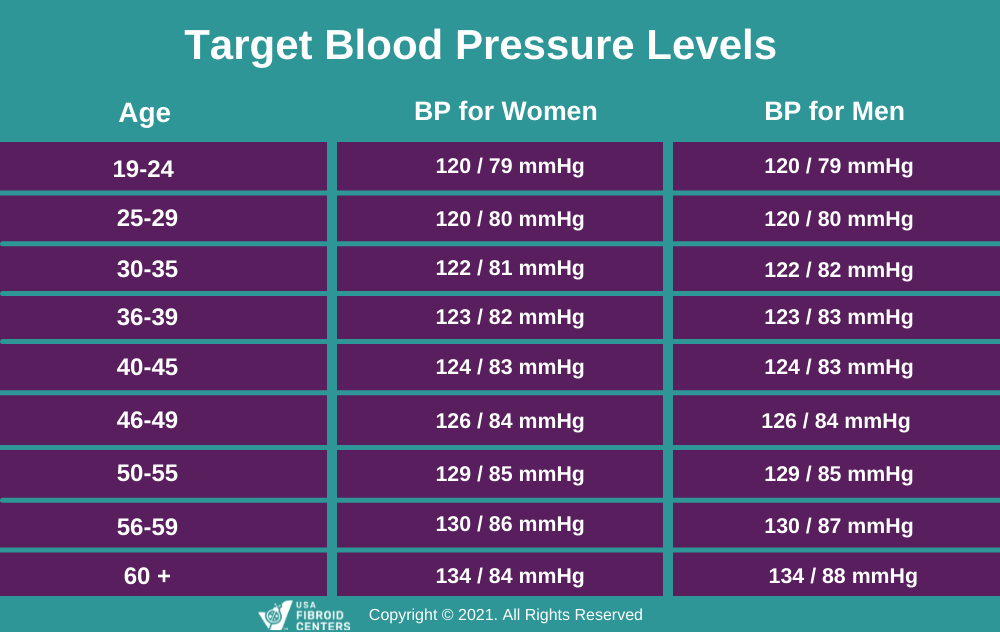
You may not think there is a connection
between your blood pressure and your period, but there is. It is important to monitor blood pressure during your period, especially if you have other underlying medical conditions. Changes in your blood pressure can indicate more serious conditions that have gone unnoticed. It’s important to know how blood pressure readings may indicate the presence of uterine fibroids.
What Is Blood Pressure?
When your heart beats, it pumps blood into your arteries. Blood pressure is the force of blood pushing against the walls of your arteries. Blood pressure is measured as two numbers:
- Systolic blood pressure: The first number in a blood pressure reading, indicates how much pressure your blood is exerting against the artery walls when your heart beats.
- Diastolic blood pressure: The second number in a blood pressure reading, it indicates how much pressure your blood is exerting against the artery walls when your heart is resting between beats.
Your doctor measures these two types at almost every visit to note if these two numbers have changed. A change in your blood pressure during your period may indicate an underlying health condition.
If you experience anemia-like symptoms and heavy mensural bleeding, take our symptoms quiz to see if you may have fibroids.
How High Blood Pressure Impacts Women’s Health
High blood pressure is more prevalent in women compared to men, especially with age. Women may experience a disproportionate increase in their systolic blood pressure levels versus their diastolic levels around menopause or after. When women go through menopause, there is a stiffening of the blood vessels, which may cause a change in blood pressure levels.
Monitoring your blood pressure is important for other aspects of women’s health, like pregnancy, uterine fibroids, and menstruation, discussed in the sections below.
To stay up to date on women’s health topics like uterine fibroids, sign up to receive our newsletter!
High Blood Pressure During Your Period
There has not been a lot of research about the relationship between blood pressure and periods, but some studies have shown that high blood pressure during your period may occur because of a spike in progesterone levels during certain stages of the menstrual cycle. Another study reported by WebMD found that 40 percent of women with moderate-to-severe premenstrual syndrome (PMS) were more likely to develop high blood pressure than women with mild-to-no PMS symptoms.
Low Blood Pressure During Your Period
Low blood pressure and periods aren’t mentioned as often as high blood pressure, but having low blood pressure is one of the common symptoms of anemia. Anemia results from a lack of red blood cells or from having dysfunctional red blood cells that can’t effectively carry oxygen to your body’s tissues. If you suffer from a lack of energy, extreme fatigue, or dizziness, it may indicate that your blood pressure is low. For an accurate diagnosis, it is best to follow up with your healthcare provider.
Can a Heavy Period Cause Low Blood Pressure?
A heavy period can result in low blood pressure because you’re losing more blood than normal. In a normal menstrual cycle, a woman loses an average of two to three tablespoons of blood over four to eight days. Menorrhagia, the scientific name for heavy bleeding during your period, causes bleeding of more than 80 ml in each cycle, which is about three ounces or the size of a travel-size shampoo. Heavy bleeding during your period is measured by frequency (if you are changing your tampons or pads every two hours or less for consecutive hours) and quantity (passing blood clots larger than the size of a quarter) of bleeding. A heavy period may cause low blood pressure, and it is also a symptom of uterine fibroids.
Hypertension and Uterine Fibroids
As mentioned above, menorrhagia, or heavy menstrual bleeding, is one of the most common symptoms of uterine fibroids. Women with menorrhagia may need to get up during the night to change their hygiene products, or experience bleeding accidents that restrict their daily activities. There is no research that finds a connection between low blood pressure and fibroids, however, we know that both conditions can cause anemia.
It’s important to seek a diagnosis from a medical professional to determine what’s causing your low blood pressure.
We do know that high blood pressure (hypertension) is related to uterine fibroids. An article published in May, 2021 cites studies that have found an association between high blood pressure and the presence of fibroids, with the prevalence of hypertension in women with fibroids as great as 40%. The same article found that other research indicates hypertension puts women at a greater risk for fibroids, and that having fibroids puts women at risk for hypertension. More research needs to be done to determine the exact relationship between high blood pressure and fibroids, though.
Get Checked for Uterine Fibroids
It’s important to pay attention to changes in your blood pressure because any change can indicate an underlying health condition that needs to be treated. If you’re experiencing high blood pressure during your period, or low blood pressure during your period, our expert doctors can answer your questions and provide an accurate diagnosis to determine if fibroids are the cause. Give us a call at 855.615.2555 or schedule your appointment online today.
Are you at risk for fibroids? Take our symptom checker quiz
Reviewed by Dr. Jacob White, a board-certified interventional radiologist with expertise in performing Uterine Fibroid Embolization (UFE). Dr. White has been studying and practicing interventional radiology for over 10 years, and was a researcher at Georgetown University Hospital Radiology and National Institutes of Health Radiology.




